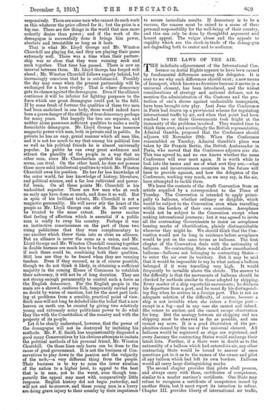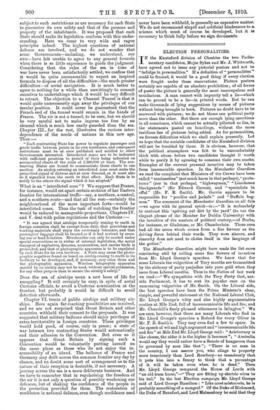THE LAWS OF THE AIR. T HE indefinite adjournment of the
International Con- ference on Aerial Rights appears to have been caused by fundamental differences among the delegates. It is easy to see why such differences should exist; a new means of transport, which knows no frontiers because it moves in a, universal element, has been introduced, and the widest considerations of strategy and national defence, not to mention the administration of the Customs and the pro- tection of one's shores against undesirable immigrants, have been brought into play. Last June the Conference in Paris had drawn up a provisional scheme for regulating international traffic by air, and when that point had been reached two or three Governments took fright at the immensity of the problems involved. They wanted time to think them over, and accordingly the British representative, Admiral Gamble, proposed that the Conference should adjourn till November 29th. When the Conference reassembled on Tuesday, Admiral Gamble's place was taken by Sir Francis Bertie, the British Ambassador in Paris, who moved that the Conference adjourn sine die. This was agreed to, and no one knows whether the same Conference will ever meet again. It is worth while to look into the issues and see of what sort they are,—what dangers and inconveniences countries in the future will have to provide against, and how the delegates of the Conference, working very much, as we may say, in the air, have attempted to tackle them.
We learn the contents of the draft Convention from an article supplied by a correspondent to the Times of Tuesday. The Convention is intended to apply princi- pally to balloons, whether ordinary or dirigible, which would be subject to the Convention even when travelling within the borders of their own countries. Aeroplanes would not be subject to the Convention except when making international journeys ; but it was agreed to invite all the contracting Governments to insist on aeroplanes bearing marks of identification, plainly distinguishable wherever they might be. We should think that the Con- vention would. not be long in existence before aeroplanes would be put on the same terms as balloons. The first chapter of the Convention deals with the nationality of balloons. No contracting State would, allow unauthorised balloons—balloons not belonging to contracting States— to enter the air over its territory. But it may be said, that it would .be impossible to say to what nation a balloon belonged if it were travelling very high. It would. frequently be invisible above the clouds. The answer to the difficulty is that the movements of balloons should be checked by methods similar to those adopted by shipping. Every master of a ship reports his movements ; he declares his departure from a port, and he must fly his distinguish- ing flag when he arrives in a foreign port. This is not an adequate solution of the difficulty, of course, because a, ship is not invisible when she enters a foreign port— except in a fog—and in any case she cannot sail inland. She comes to anchor, and she cannot escape observation for long. But the analogy between air shipping and sea shipping must be observed as far as possible, and one cannot say more. It is a good illustration of the per- plexities caused by the use of the universal element. All balloons would be registered as ships are registered, and every January the contracting States would ex-change their latest lists. Further, if a State were in doubt as to the nationality of a balloon which had. entered its air, any other contracting State would be bound to answer at once questions put to it as to the names of the owner and pilot of any balloon which had left its own borders. Balloons would all carry large distinguishing marks.
The second chapter provides that pilots shall possess, and always carry with them, certificates of competence, similar to a master mariner's certificate. One State may refuse to recognise a certificate of competence issued by another State, but it must report its intention to refuse. Chapter III. provides liberty of international air traffic, subject to such restrictions as are necessary for each State to guarantee its own safety and that of the persons and property of the inhabitants. It was proposed that each State should make its legislation conform with this under- standing. Here we come to very wide and vague principles indeed. The highest questions of national defence are involved, and we do not wonder that some Governments—including, we understand, our own—have felt unable to agree to any general formula when there is so little experience to guide the judgment. Considering that the rules of the sea in time of war have never been satisfactorily settled, we confess that it would be quite unreasonable to expect an inspired formula to dispose of all the difficulties—the much greater difficulties—of aerial navigation. It is much better to agree to nothing for a while than unwittingly to commit ourselves to undertakings which it would be very difficult to retract. The objection to a Channel Tunnel is that it would quite unnecessarily sign away the privileges of our insular position. It could never be guaranteed that the French end of the tunnel would remain in the hands of France. The air is not a tunnel, to be sure, but we should be very careful not to make ingress too free by an element which is much less easily guarded than the sea. Chapter III., for the rest, illustrates the curious inter- dependence of the needs of nations in this new age. Thus :— "Each contracting State has power to regulate passenger and goods traffic between points in its own territories, and consequent restrictions must be at once published and notified to other Governments interested. Interdicted zones are to be indicated with sufficient precision to permit of their being indicated on aeronautical charts of the scale of 1/500,000 at least. The con- tracting States are bound to communicate those charts to one another. An airship entering an interdicted zone must make the prescribed signal of distress and at once descend, as it must also do if signalled from the earth to that effect. Each State is to notify to the others the signal which it has adopted."
What is an "interdicted zone " ? We suppose that France, for instance, would set apart certain sections of her Eastern frontier for international traffic—say, a northern, a central, and a southern route—and that all the rest—certainly the neighbourhood of the more important forts—would be interdicted zones. Thus the task of watching the frontier would be reduced to manageable proportions. Chapters IV. and V. deal with police regulations and the Customs :— "It was agreed that airships temporarily coming to earth in foreign countries shall be exempt from duty, that provisions and working materials shall enjoy the customary tolerance, and that passengers' luggage shall be treated as if it had arrived by cross- ing sea or land frontiers. Merchandise can only be carried under special conventions or in virtue of internal legislation, the aerial transport of explosives firearms, ammunition, and carrier birds is prohibited, and that of photographic apparatus is to be regulated by each State for its own territory. A State may cause the photo- graphic negatives found on board an airship coming to earth in its territory to be developed, and, if necessary, inay seize them and the photographic apparatus. Wireless telegraphic apparatus carried by an airship may not be used, without special permission, for any other purpose than to secure the airship's safety."
Does the era of airships mean. a new lease of life for smuggling? It will certainly be easy, in spite of aerial Customs officials, to avoid a *Customs examination at the frontier, but probably it would be difficult to avoid detection afterwards.
Chapter -VI. treats of public airships and military air- ships. Here again far-reaching possibilities are involved, and we are not surprised that Great Britain and other countries withheld their consent to the proposals. It was suggested that military balloons should enjoy privileges of extra-territoriality in foreign countries. These privileges would hold good, of course, only in peace; a state of war between two contracting States would automatically end their adhesion to the Convention. But even so it appears that Great Britain by signing such a Convention would be voluntarily putting herself on the same plane as those who do not enjoy the in- accessibility of an island. The balloons of France and Germany may drift across the common frontier any day by chance, and no doubt some sort of arrangement as to the nature of their reception is desirable, if not necessary. A journey across the sea is a more deliberate business. And we have to remember that in regularising the freedom of the air it is not only a question of possibly weakening our defences, but of shaking the confidence of the people in the protection provided for them. The restoration of confidence in national defence, even though confidence need never have been withheld, is generally an expensive matter. We do not recommend stupid and artificial hindrances to a science which must of course be developed, but it is necessary to think fully before we sign documents.











































































 Previous page
Previous page